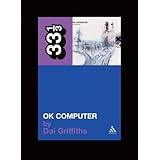
Average Reviews:

(More customer reviews)The 33 1/3 series is a gift and when I saw they were writing a book on one of my all time favorite recordings, OK Computer, I couldn't have been happier.
The book in a word however, blows.
Much of the book is dedicated to some aimless theories about the place of LP records and cds in the broad landscape of musicology. Considering how painfully short this book is to begin with, it seems like a perfect waste of space - filler for an academic journal. When the author does get around to the actual work of Radiohead, he almost exclusively refers to the musical score and references much of their work as only "sound effects." While his analysis of the notes on the page is at times compelling, he fails miserably to describe "musical" and "technical" choices not accounted for in the score and their impact on the recording.
While other books in series may at times be criticized for being too journalistic, and speculating at the intent of the musicians, here the author goes to far in the other direction -- there isn't even a mention of the unique recording space this album was crafted in, not to mention any speculation as to the effect it might have had. Nigel Godrich the producer (along with the band) and engineer is reduced merely a mention, any notion of sculpting sound with studio tools is non-existent.
Considering the direction the band has pursued after this record, highly electronic and diffuse by western musical standards, this book serves little interesting purpose, but perhaps to serve as a footnote in a more comprehensive book by an author who can synthesize the roll of the composer with the concept of a recording as piece of art that is constructed with a different set of skills than the score it maybe also represented by.
In short, don't bother buying this book if you want to read anything about Radiohead the band or how they create music. This one will have little interest to anyone but musicology students and most of them will find it painfully incomplete as well.
Click Here to see more reviews about: Radiohead's OK Computer (Thirty Three and a Third series)
Seemingly granted 'classic album' status within days of its release in 1997, OK Computer transformed Radiohead from a highly promising rock act into The Most Important Band in the World - a label the band has been burdened by (and has fooled around with) ever since. Through close analysis of each song, Dai Griffiths explores the themes and ideas that have made this album resonate so deeply with its audience - and he argues that OK Computer is one of the most successfully realised CD albums - as opposed to vinyl albums - so far created. 33 1/3 is a series of short books about critically acclaimed and much-loved albums of the last 40 years. Focusing on one album rather than an artist's entire output, the books dispense with the standard biographical background that fans know already, and cut to the heart of the music on each album. The authors provide fresh, original perspectives, often through their access to and relationships with the key figures involved in the recording of these albums. By turns obsessive, passionate, creative, and informed, the books in this series demonstrate many different ways of writing about music.(A task that can be, as Elvis Costello famously observed, as tricky as dancing about architecture.) What binds this series together, and what brings it to life, is that all of the authors - musicians, scholars, and writers - are deeply in love with the album they have chosen. Previous titles in this now well-established series have beaten sales expectations and received excellent review coverage - the third batch is sure to continue this success. More titles follow in the spring of 2005.
Click here for more information about Radiohead's OK Computer (Thirty Three and a Third series)

0 comments:
Post a Comment